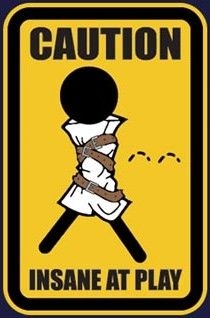Coming to Work to Be Dysfunctional
A while back, I was having a conversation with a manager who was new to their organization. A very bright and talented individual, this manager expressed frustration about some of the crazy within the organization. In a moment of exasperation this manager said, "I just don't understand coming to work to be dysfunctional."
 This is a very appropriate comment for the situation. Many are very concerned about customer service people in the small business. Now, great customer service is important, but a business is a business, and good sense and an eye on the reasonable must come into play. Saying "yes" to every customer request without first asking "How do we do it?" is a sure way to fail. When you say “yes” to that customer request for 25 pounds of unicorn ribs without first asking “where do we find unicorn ribs?” you are sure to perturb your customers. If the unicorn ribs strike you as a stretch, how about 15 gallons of unpasteurized organic goats’ milk?
This is a very appropriate comment for the situation. Many are very concerned about customer service people in the small business. Now, great customer service is important, but a business is a business, and good sense and an eye on the reasonable must come into play. Saying "yes" to every customer request without first asking "How do we do it?" is a sure way to fail. When you say “yes” to that customer request for 25 pounds of unicorn ribs without first asking “where do we find unicorn ribs?” you are sure to perturb your customers. If the unicorn ribs strike you as a stretch, how about 15 gallons of unpasteurized organic goats’ milk?
You need to ask more than "How do we do it?" You need to ask the question, “How can we do it without losing money?" Doing something a customer requests without asking, “How can we do it without losing money?" is a dysfunctional act. Good managers cringe when they see that kind of dysfunction. At what point is good sense replaced by a knee-jerk reaction to fulfill crazy requests?
This kind of dysfunction, the customer-at-any-cost dysfunction, comes from a lack of will to be reasonable. A dysfunctional business culture like this doesn't just happen; it is allowed to spawn and breed. A product of confused leadership, confused communication, and an absence of conflict, this is the dysfunction that kills companies in the name of good customer service. Of those three sources—confused leadership, confused communication and an absence of conflict—the missing conflict is perhaps the most damaging.
Most people dislike conflict. Why? Fear is one reason. A lack of self-esteem is another. An inability to be assertive is yet another. Amazingly, I've even heard someone say it is not polite to create conflict.
The problem with these arguments against conflict in the workplace is simple; to refuse to have conflict is to refuse to take action to resolve a problem. Conflict is the first step toward the resolution of a problem. Yes, one of the Seven Ways to Deal with a Problem is to ignore it, but that is the path to failure. Conflict is the inevitable result of standing up to a bad decision. Even if you don't have conflict with someone else, internal conflict will create stress when you're attempting to make a decision.
I've written about the decision troika in other posts. Each of us possesses a decision troika. The members are the head, the heart, and the gut, and they represent, respectively, our reasoning, our emotions, and our intuition. When we face a decision, there is often conflict between at least two of the members of the decision troika. There are things we do in our own lives that logically we know we should not do, or that we find repulsive emotionally, or that our intuition warns us against. Yet we still take the wrong path. Why? Because we are avoiding the internal conflict.
Avoiding conflict in a business setting creates dysfunction. The successful business leader sees conflict as his friend. The successful business leader makes a commitment to do battle with the resistance in the market against competition, to engage in a struggle to improve. They lead their teams into a battle in the market place, encouraging their followers not to be sheep, but to step up and fight against the stupid and thoughtless act.
Functional organizations never tolerate dysfunction. Tolerance is a lack of conflict.

And conflict is good.


